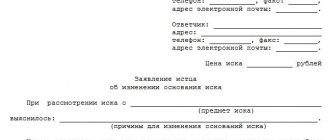Often payment from debtors is received when a claim is filed in court. For example, the debtor had a debt under a supply agreement and did not pay it for a certain time, and when the claimant went to court and the claim was accepted, payment was received. In such situations, the plaintiff may waive the claim by filing a petition.
ATTENTION : our lawyer in civil and arbitration cases will help in the matter of abandoning the claim on the side of the plaintiff or defendant: professionally, on favorable terms and on time. Call!
Declaration of waiver of claim
The application for refusal is submitted to the same court where the claim was accepted for consideration, indicating the case number and initials of the judge. The plaintiff may file an application at any stage of the case before the court makes a decision.
The application must indicate the following:
- Name of the parties, their details and address, name of the court, address
- The content of the claim should state what case the plaintiff is appealing for, on the basis of what requirements he refuses the case (for example, the parties entered into a settlement agreement, the debtor paid for the goods)
Based on this statement, the plaintiff waives the claims that were presented in the statement of claim. The plaintiff must act independently and not under duress. The refusal of the claim must be clear and reasoned. The court considers the application to abandon the claim within five calendar days and issues an appropriate ruling.
Changing the amount of claims
When considering a dispute in arbitration, the plaintiff, under Art. 49 of the Arbitration Procedure Code of the Russian Federation, may increase or decrease the amount of requirements. He can exercise this right before a court ruling is made, which ends the proceedings on the merits.
An increase in the size of claims, in particular, is an increase in the cost of the claim while maintaining the content of the claim. This action cannot be associated with the presentation of additional claims that were not previously stated.
For example, a request for monetary sanctions cannot be considered as a change in the amount of claims in a claim for collection of the principal debt. This kind of requirement, according to general rules, must be stated separately.
Consequences of refusing a claim
On the basis of civil law, if the claims are abandoned, the court terminates the proceedings. Termination of the case entails consequences, namely, that the plaintiff will not be able to again go to court with claims with the same subject and grounds.
The plaintiff renounces the claims when the issue is settled with the defendant, however, it is necessary to take into account the circumstances that if the defendant voluntarily wants to resolve the issue in dispute, then it is better to conclude a settlement agreement between the parties, because in the future the plaintiff will not be able to re-present similar demands to him, only if changing the subject or basis of the claim.
What does the addition to the statement of claim contain?
The main reason for using additions to claims is the right of the participants in the problem under consideration to give explanations, present arguments, and also to express claims against the arguments of the other party.
In accordance with the provisions of Article 151 of the Civil Code of the Russian Federation, in cases where a citizen is harmed of a moral nature by actions that may violate his rights, the court may impose certain requirements on the defendant, according to which the latter will be obliged to pay the plaintiff certain monetary compensation.
State duty upon refusal of a claim
When a person files an application to abandon a claim, he does not pay the state fee for this application, but he is entitled to a refund of the state fee for filing the initial statement of claim in court. The state duty is subject to refund from the federal budget in the event of termination of the proceedings, since the refusal of the claim entails the termination of the proceedings, the court must return the state duty paid by the person (more information about the application for the return of the state duty at the link).
The amount to be refunded is indicated in the definition. A person, based on this determination, must obtain a certificate for the refund of state duty from the court that heard the case. The certificate is issued within 5 business days from the date of submission of the application for the certificate. The application must be accompanied by a payment order (payment document) and a copy of the power of attorney (if a representative is acting).
After receiving a certificate from the court, the state duty must be returned by submitting an application to the tax office to which the funds were paid. The following must be attached to the tax application:
- Payment order (document confirming payment of state duty);
- Certificate of return from the court;
- A copy of the court ruling, which states that the state duty is refundable;
- A copy of the power of attorney (for representatives).
Refunds of state duties by tax authorities are carried out within a month from the date of acceptance of the application.
Commentary on Article 173 of the Civil Procedure Code
The commented article establishes the procedure and consequences of the plaintiff’s refusal of the claim, the recognition of the claim by the defendant and the conclusion of a settlement agreement.
According to Part 1 of the commented article, the plaintiff’s statement of refusal of the claim, the recognition of the claim by the defendant and the terms of the settlement agreement between the parties are entered into the minutes of the court hearing and signed respectively by the plaintiff, the defendant, and both parties. If the waiver of the claim, recognition of the claim or a settlement agreement between the parties is expressed in written statements addressed to the court, these statements are attached to the case, as indicated in the minutes of the court session.
The court explains to the plaintiff, defendant or parties the consequences of abandoning the claim, recognizing the claim or concluding a settlement agreement between the parties (Part 2).
By virtue of part 3 of the commented article, if the plaintiff refuses the claim and the court accepts it or approves a settlement agreement between the parties, the court issues a ruling, which simultaneously terminates the proceedings. The court's ruling must indicate the terms of the settlement agreement between the parties approved by the court. If the defendant recognizes the claim and accepts it, the court makes a decision to satisfy the claims made by the plaintiff.
If the court does not accept the plaintiff’s refusal of the claim, the defendant recognizes the claim, or does not approve the settlement agreement of the parties, the court makes an appropriate ruling and continues to consider the case on the merits (Part 4).
In paragraph 32 of the Resolution of the Plenum of the Supreme Court of the Russian Federation dated June 24, 2008 N 11 “On the preparation of civil cases for trial” (as amended on February 9, 2012) it is explained that at the stage of preparing the case for trial, the plaintiff may refuse claim, the parties may enter into a settlement agreement or an agreement to submit the dispute to arbitration. Since resolving the issue of accepting a waiver of a claim and approving a settlement agreement between the parties at the preparation stage does not differ from the corresponding procedure during court proceedings (Article 173 of the Code of Civil Procedure of the Russian Federation), such administrative actions of the parties can be procedurally enshrined in a preliminary court hearing.
Resolving the issue of accepting a waiver of a claim and approving a settlement agreement between the parties in the preparation stage does not differ from the corresponding actions of a judge during a trial (Article 173 of the Code of Civil Procedure of the Russian Federation).
The plaintiff’s refusal of the claim, as well as a settlement agreement between the parties, is not binding on the judge. If these actions are contrary to the law or violate the rights and interests protected by law of other persons, the waiver of the claim is not accepted, about which the judge issues a reasoned ruling in compliance with the requirements provided for in Art. Art. 224, 225 Code of Civil Procedure of the Russian Federation.
When the parties enter into an agreement to submit a dispute to arbitration, the judge, in relation to the rules provided for in Part 4 of Art. 152 and art. 222 of the Code of Civil Procedure of the Russian Federation, leaves the statement of claim without consideration. Statement on the agreement of the parties to refer the dispute to an arbitration court by analogy with the rules of Art. 173 of the Code of Civil Procedure of the Russian Federation should be entered into the protocol and signatures of both parties should be obtained, and if the parties submit a corresponding written statement, it should be attached to the case. It is also necessary to clarify the provisions of Art. 223 of the Code of Civil Procedure of the Russian Federation, consequences of leaving an application without consideration.
The Plenum of the Supreme Court of the Russian Federation in paragraph 10 of Resolution No. 9 of May 29, 2012 “On judicial practice in inheritance cases” also explained that “the court approves settlement agreements in cases arising from inheritance legal relations only in cases where this is not violates the rights and legitimate interests of other persons and the norms of civil law allow the resolution of relevant issues by agreement of the parties.
Overturning the decision of the court of first instance and the court of appeal, the Judicial Collegium for Civil Cases of the Supreme Court, in Ruling No. 46-KG15-14 dated September 1, 2015, indicated that “in violation of the requirements of Articles 39 and 173 of the Civil Procedure Code of the Russian Federation, the court’s statement of the representative plaintiff B.N.M. the parties did not properly formalize the refusal of the claim regarding the requirements for the eviction of minor children from the apartment, although in the decision he indicated a change in the claims of R.V.V. during the consideration of the case. The court did not explain to the plaintiff’s representative the consequences of abandoning the claim in this part, did not discuss at the court hearing the issue of accepting the plaintiff’s representative’s refusal of part of the claim, and did not make a determination in accordance with Art. 220 of the Code of Civil Procedure of the Russian Federation on the termination of proceedings in the case regarding the claim for the eviction of minor children in connection with the plaintiff’s refusal of these demands.
This is important to know: Requirements for a statement of claim in civil proceedings under the Code of Civil Procedure of the Russian Federation
It must be assumed that when approving a settlement agreement in a case involving a child, it is necessary to find out whether the terms of the agreement meet the interests of the child, and, if necessary, involve the guardianship and trusteeship authority in the case, since there is often a conflict between the interests of the parents, persons replacing them, and the interests of the child contradictions arise. In addition, settlement agreements with the participation of a child cannot be approved in cases of deprivation of parental rights, on restriction of parental rights, on restoration of parental rights, on adoption, on cancellation of adoption, on declaring a marriage invalid and in some other cases involving a child.
Waiver of claim or settlement agreement
If the parties have reached a voluntary agreement, then the plaintiff waives the claim. There are two options between the parties, either the plaintiff simply waives the claim without any documented documents, or the parties can enter into a settlement agreement before the court makes a decision.
The settlement agreement is carried out and approved by the court, it is binding between the parties, for example, the parties can agree on the payment of payments for a certain period, which the defendant will have to pay.
Often the parties refuse to enter into a settlement agreement, but this may have consequences in the future, for example (if the debtor promised to pay the amount of debt for a certain period without a settlement agreement, he may not comply with the court’s ruling; in fact, his actions are not documented). A settlement agreement between the parties is concluded with the aim of minimizing risks in the future, so that the parties have something to refer to.
Carrying out refusal in civil proceedings
The application form can be submitted in oral or written format. The judicial authorities simultaneously check the powers of the party’s representative. The refusal is drawn up at any stage of the proceedings, including the first instance and the appeal stage. The recognition of the claim by the defendant will be taken into account, which becomes another form of completion of the case. Thus, the party freely expresses its will to take measures to fulfill all points of the claim.
A positive decision by the court is not made when there is a connection with unfair actions and abuse of procedural rights. Another form of closure is a settlement agreement. This is how a voluntary transaction between subjects is carried out. Individuals negotiate independently and approve a set of measures to fulfill a number of obligations. If the participants evade the accepted settlement agreement, the fact is recorded in the court case.
This is important to know: Calculation of the amount of claims to the arbitration court: sample
Court approval is mandatory. The agreement comes into force immediately after consideration by the authorities. This aspect makes it possible to satisfy the demands of both the plaintiff and third parties without lengthy proceedings. It will no longer be possible to file a similar claim if a settlement agreement has been accepted.
Appealing the refusal of a claim
If the court refuses to accept the application for refusal, then its decision can be appealed. You can appeal a decision to refuse to accept an application for refusal only if it contradicts the law or your requirements and was not made in good faith or legally.
A private complaint is drawn up against the ruling made by the court, in which the person indicates why he does not agree with the court’s requirements. The complaint should indicate with which content of the definition the party does not agree, and provide appropriate references to the law if the content contradicts them. The person must clearly and reasonably state his position. The complaint is filed in the same court in the same case that was considered.
USEFUL : watch the video with tips on appealing a court decision, write your question in the comments of the video








